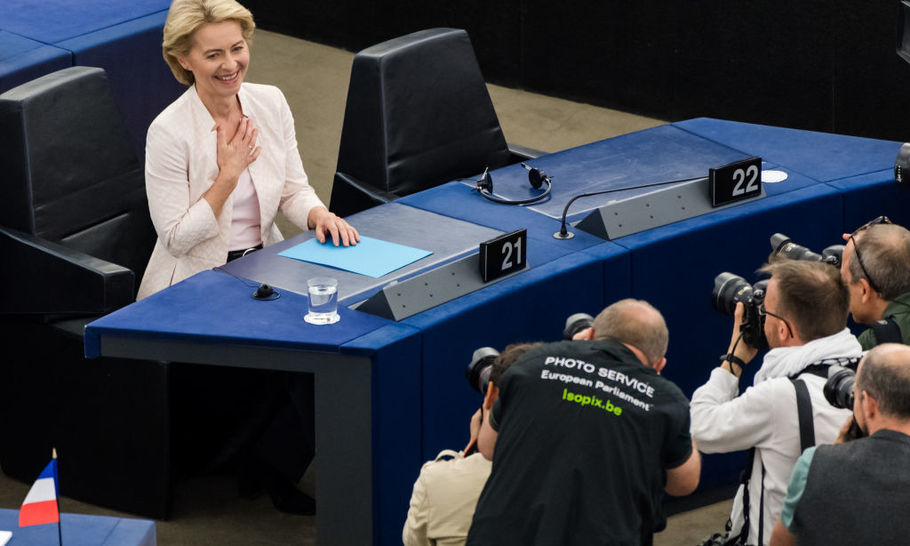Ursula von der Leyen will struggle to deliver an EU "that strives for more"

Geert Vanden Wijngaert/Bloomberg via Getty Images
Ursula von der Leyen, the former German defence minister who was nominated by the European Council as the next European Commission President, will take over her new role on 1 November. Following days of discussions and negotiations with political groups in the European Parliament, her nomination was narrowly approved with a majority of 383 votes.
The vote was a secret ballot, but there had been indications of which groups would and would not support her, so the result does not come as a surprise.
For those who were reluctant to support her nomination, there were few alternative options available. The Spitzenkandidat system was not used, and the delicate balance of the overall leadership jobs package had already been decided. This meant, for example, any alternative to von der Leyen would also have had to be from the centre-right European People’s Party (EPP). Socialist MEPs may have preferred one of their own, but it seems that many ultimately decided von der Leyen was the best President they could get.
As soon as she begins her presidency, von der Leyen will have a number of pressing issues on the table and expectations from all sides. It will be a difficult task to satisfy everyone.
Prior to the vote she set out her presidency’s priorities to MEPs, trying to respond to the various demands of the main groups, especially the Socialists and the liberal Renew Europe.
To satisfy the centre-left, she committed to a European unemployment scheme, a European-wide minimum wage for workers, an EU gender equality strategy, as well as fair taxation.
For those worried about the democratic implications of the way she was nominated by EU leaders, von der Leyen pledged to improve the Spitzenkandidat system, provoking laughter among MEPs in the room. The process is unlikely to be used again, as even Jean-Claude Juncker has recognised . She also committed to giving the right of legislative initiative to the Parliament (currently only the Commission holds this right) in an attempt to make the institution stronger.
To satisfy the liberals, von der Leyen promised a Conference on the Future of Europe lasting from 2020 to 2022 – an idea strongly supported by President Emmanuel Macron . However, this two-year exercise of listening to European citizens risks ending with a number of proposals that are impossible to achieve and requiring treaty changes that only a few member states will be willing to make. How does this resonate with EU citizens who have voted for change in May’s elections and who want to see institutions and their new leaders carry out changes now, rather than engaging in more Macron-style debating?
She also proposed “a new pact” on migration and asylum, including a “relaunch” of the much-disputed Dublin Regulation, and called for more solidarity. There have been multiple attempts to reform asylum and migration policies, with proposals ranging from ‘controlled centres’ to ‘disembarkation platforms’ and most of them are now forgotten. Von der Leyen’s calls for new ways to share the burden of migration across the EU, as well as the idea of a new additional Rule of Law mechanism, risk alienating the Polish and Hungarian governments and blocking the whole reform process.
Meanwhile, her Green Deal for Europe, which was not enough to secure the support of Green MEPs, also faces hurdles. She said she wants Europe to “become the first climate-neutral continent in the world by 2050” – just a month after member states were unable to reach a common conclusion on a climate neutrality target.
A long-term commitment of von der Leyen’s has been to make the EU a stronger foreign policy actor by moving to qualified majority voting (QMV) decision-making (rather than unanimity) and increasing investments into European defence. Previously she wrote that “it would be counterproductive to scale back the involvement of Europe’s national parliaments a time when Europe is struggling to earn new trust.”
This resonates with the current Commission’s proposals , as well as the stance of pro-integration member states such as France and Germany, who are seeking to improve the EU’s role in the world – especially after the UK leaves. But any change that would mean reducing the ‘veto’ powers of national governments, especially in sensitive manners such as foreign affairs and security, will be controversial and not so easy to implement.
To add to all of these challenges, grand plans for EU reform risk being overshadowed by the looming prospect of a potential no deal Brexit, which has become a more likely scenario. Von der Leyen said she would support another extension of Article 50, but this decision lies with EU27 heads of government, not her. In any case, any decision on extension before 31 October will be made when the Commission will still be under Juncker’s presidency. If the UK leaves on World Trade Organisation terms on 1 November, von der Leyen’s first task as President will be to deal with the EU’s response to the consequences of no deal for trade and security.
As von der Leyen’s critics from across the political spectrum have pointed out, her proposals lack ambition to change the direction of the EU’s path and to tackle many of the issues raised during the European election campaign (perhaps because she herself did not campaign). This was partly reflected in her tight majority of 9 votes. With a more fragmented new European Parliament, and the opposition of national governments to several of these proposals, delivering an EU “that strives for more” will be a challenging task.





